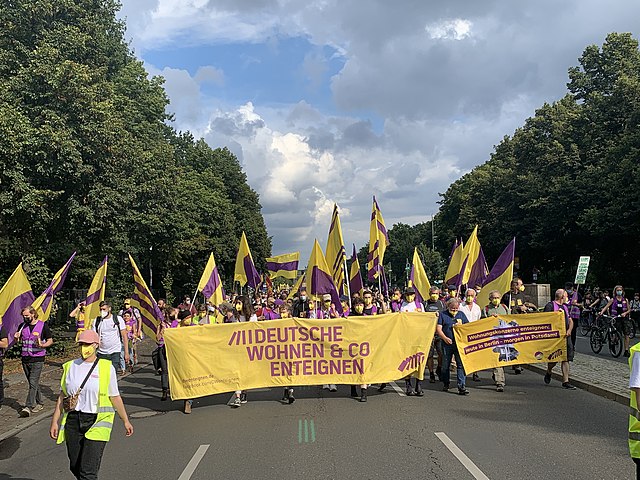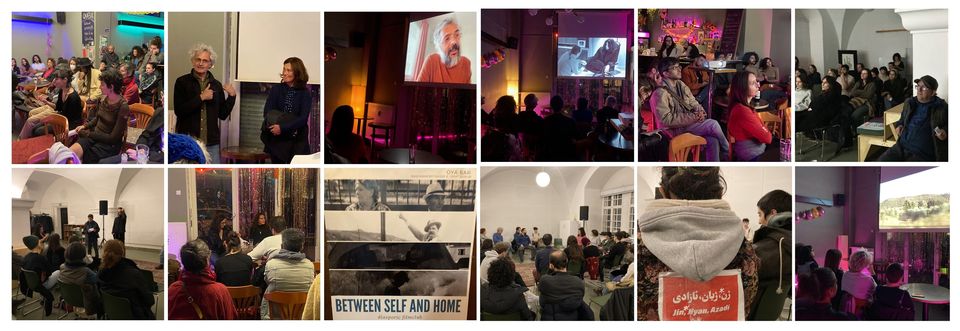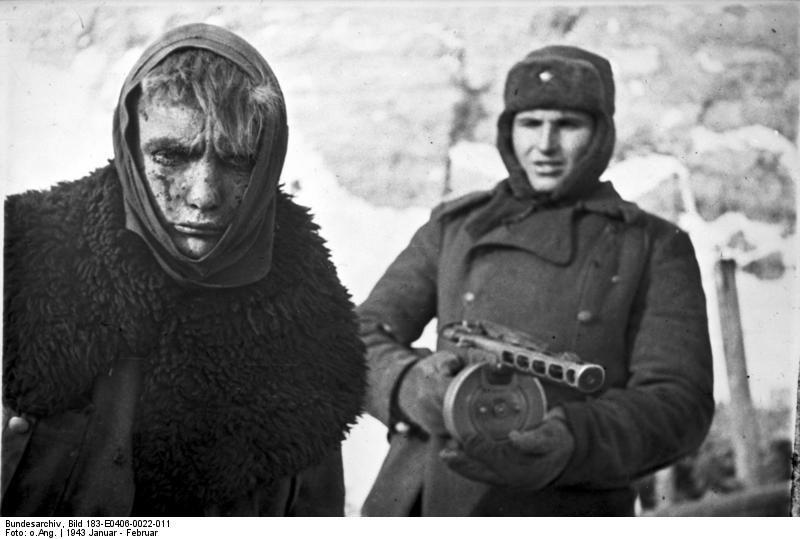February 2, 2023 marked the 80th Anniversary of the Soviet victory at the Battle of Stalingrad. An appropriate time to correct Eitay Mack’s article for Left Berlin August 20, 2022. While I support Eitay’s call for an open enquiry into the still shrouded death of Raoul Wallenberg, they also made two claims I want to contextualise and challenge. First Putin’s identification with ‘The Great Patriotic War’, and secondly that the Molotov-Ribbentrop Pact was a “collusion between Stalin and Hitler between 1939 and 1941.”
Mack will feel vindicated by Putin’s recent lament at the Stalingrad anniversary events about the reappearance of German tanks on Russia’s fringes. Putin’s personal sordid history, only merits the term rapacious capitalist. Accepting Putin’s claims that his attack on Ukraine is “anti-fascism” not imperialism, is naïve in the extreme. This identification of Putin with the Soviet WWII heroism is therefore clearly ridiculous, and on that we can agree. However, Mack’s allegations on the Molotov-Ribbentrop Pact are a widely held mischaracterization. Another “Just-so-story” about Stalin: Where the Soviet government negotiated for a collective security pact with Britain and France against German aggressive expansion, meanwhile signing a pact with Germany precipitating World War II. This necessitates reviewing pertinent history.
Hitler expressed Nazi foreign policy frankly:
“We National Socialists consciously draw a line beneath the foreign policy tendency of our pre-War period. We stop the endless German movement to the south and west, and turn our gaze towards the land in the East. If we speak of soil in Europe today, we can primarily have in mind only Russia”. Hitler, p.584, 604
Thus, the Nazi government in Germany in January 1933 presented great danger to the Soviet Union and the world. How did the USSR and Western powers react? Soviets analysed imperialist Powers into two groups: One (Germany, Italy and Japan) had high productive power but restricted markets and spheres of influence. Hence they were aggressive Powers. Another group (Britain, France and the USA) – had relatively large markets and spheres of influence and were relatively non-aggressive. Consequently in the 1930s the USSR attempted to form a collective security alliance with Britain and France. That aimed to be strong enough either to deter the aggressive imperialist states from war or to secure their defeat.
Instead Britain (Neville Chamberlain) and France (Eduard Daladier) pursued ‘Appeasement’, inspired by their detestation of socialism and wish to see the Soviet Union destroyed. Foreign Secretary Lord Halifax told Hitler in November 1937 that:
“he and the British Government were well aware that the Fuehrer had attained a great deal. Having destroyed Communism in his country, he had barred the road of the latter to Western Europe and Germany was therefore entitled to be regarded as a bulwark of the West against Bolshevism. In an Anglo-German rapprochement, the four great West European Powers must jointly set up lasting peace in Europe” (‘Documents on German Foreign Policy: 1918-1945’, Series D, Vol 1; London; 1954).
Nevertheless, the USSR persisted efforts for a collective security alliance. But by March 1939, delays of the Western powers led to Stalin warning the 18th Congress of the CPSU:
“England, France and the USA draw back and retreat, making concession after concession to the aggressors. Thus we are now witnessing an open redivision of the world and spheres of influence at the expense of the non-aggressive states, without the least attempt at resistance, and even with a certain amount of connivance.”
Imperialist and delaying strategy for an Anglo-French-Soviet mutual security pact stalled it. As it dragged on month after month, Moscow fired several warning shots. On 11 March 1939 Joseph Davies, former US Ambassador in Moscow, now Ambassador to Brussels, wrote about Stalin’s speech to the 18th Congress:
“It is a most significant statement. It bears the earmarks of a definite warning to the British and French governments that the Soviets are getting tired of ‘non-realistic’ opposition to the aggressors. It certainly is the most significant danger signal that I have yet seen” (J. E. Davies: ‘Mission to Moscow’; London; 1942).
On 31 March 1939, the British government unilaterally guaranteed to defend Poland, but Poland refused to enable USSR troop entry in any defence. The leader of the liberal Party, David Lloyd George, said:
“I cannot understand why, before committing ourselves to this tremendous enterprise, we did not secure beforehand the adhesion of Russia. If Russia has not been brought into this matter because of certain feelings that Poles have that they do not want the Russians there, unless the Poles are prepared to accept the one condition with which we can help them, the responsibility must be theirs” (Parliamentary Debates. 5th Series, House of Commons, Volume 35; London; 1939; Col. 2,510).
Public pressure mounted for collective security. So, on 15 April 1939 the British government suggested the USSR should offer military assistance to any state bordering the Soviet Union subject to aggression. On 17 April the Soviet government replied that it would not consider a unilateral guarantee, which would put the Soviet Union in a position of inequality with the other Powers concerned.
The USSR proposed instead: A trilateral mutual assistance treaty by Britain, France and the Soviet Union against aggression; extending guarantees to the Baltic States (Estonia, Finland, Latvia and Lithuania), limiting Germany intentions eastwards; and thirdly that the treaty detail the military assistance required. On 27 May the British and French governments replied to the Soviet proposals with a proposed tripartite pact, but privately PM Chamberlain commented:
“In substance it gives the Russians what they want, but in form and presentation it avoids the idea of an alliance and substitutes declaration of intention. It is really a most ingenious idea” (Chamberlain Archives, 11/1/1101).
Molotov, rejected it as hostilities would not trigger immediate mutual assistance, but merely ‘consultation’ through the League of Nations. On 29 June Andrei Zhdanov revealed differences in the leadership of the CPSU in ‘Pravda’, upon the sincerity of British and French governments for a genuine treaty of mutual assistance:
“the negotiations have reached a deadlock. My friends still think that the English and French Governments had serious intentions of creating a powerful barrier against aggression in Europe. I believe that the English and French Governments have no wish for a treaty to which a self-respecting State can agree. The Soviet Government took 16 days in preparing answers to the various English projects and proposals, while the remaining 59 days have been consumed by delays and procrastinations on the part of the English and French. Not long ago the Polish Minister of Foreign Affairs, Beck, declared unequivocally that Poland neither demanded nor requested from the USSR anything in the sense of granting her any guarantee whatever. However, this does not prevent England and France from demanding from the USSR guarantees for Poland. It seems to me that the English and French only talks about a treaty in order to speculate before the public opinion in their countries on the allegedly unyielding attitude of the USSR, and thus make easier for themselves the road to a deal with the aggressors. The next few days must show whether this is so or not” (‘Documents on German Foreign Policy: 1918-1945’, Series D, Volume 6; London; 1956).
On 17 July the Soviet government insisted that a military convention be signed at the same time as the political treaty, to prevent any hedging. Meanwhile on 29 July the German Foreign Office instructed Count Fritz von der Schulenburg to state to Molotov:
“We would be prepared to safeguard all Soviet interests and to come to an understanding with the Government in Moscow (we could) so adjust our attitude to the Baltic States as to respect vital Soviet interests in the Baltic Sea” (‘Documents on German Foreign Policy: 1918-1945’, Series D, Volume 6; London; 1956)
On 23 July the British and French governments finally agreed to begin military discussions. Admiral Reginald Plunkett-Ernie-Erle-Drax headed the delegation. The British government being unaware that the aeroplane had been invented, the delegation left by slow boat to Leningrad, arriving in Moscow on 11 August. Furthermore, the British delegation was officially instructed to: “Go very slowly with the conversations”.
Drax said he had no negotiating powers, but would ‘hold talks’. By 15 August Voroshilov concluded that unless Soviet troops could enter Polish territory it was physically impossible for the Soviet Union to assist Poland and it was useless to continue. On 21 August, the negotiations were adjourned indefinitely – after the Soviet government decided they were being toyed with. Clearly Germany was being pointed East by the West.
What eventually precipitated accepting the pressing German proposals for rapprochement was the discovery by Soviet intelligence that the Chamberlain government was secretly negotiating for a military alliance with Germany. This would have threatened the Soviet Union with aggression from four Powers – Britain, France, Germany and Italy.
Ribbentropp arrived in Moscow on 23 August, and the non-aggression pact was signed that day. Its text was almost identical with the Soviet draft submitted to the Germans on 19 August. Neither party would attack the other, and should one party become the object of belligerent action by a third Power, the other party would render no support to this third Power.
Even more strongly criticised than the pact itself has been a ‘Secret Additional Protocol’ which laid down German and Soviet ‘spheres of interest’ in Europe. However where two states are likely to be affected by war but wish this not to start mutual conflict, then the demarcation of spheres of interest is a legitimate and desirable act.
The ‘secret additional protocol’ declared:
“1. In the event of a territorial and political transformation in the territories belonging to the Baltic States (Finland, Estonia, Latvia, Lithuania) the northern frontier of Lithuania shall represent the frontier of the spheres of interest both of Germany and the USSR.
2. In the event of a territorial and political transformation of the territories belonging to the Polish State, the spheres of interest both of Germany and the USSR shall be bounded approximately by the line of the rivers Narew, Vistula and San” (‘Documents on German Foreign Policy . . . ‘, Series D, Volume 7).
This meant that the German government promised that, if German troops invaded Poland, they would not attempt to advance beyond the ‘Curzon Line’, drawn by Lord Curzon, after the First World War as the boundary separating the Poles from the Ukrainians and Byelorussians. The area east of this line had been Soviet territory seized from the Soviet Union following the Revolution.
Germany agreed that it would raise no objection to the Soviet government taking whatever action it considered desirable east of this line. Speaking to the Supreme Soviet of the Soviet Union on 31 August, Molotov described the Soviet-German Non-Aggression Pact as:
“A turning-point in the history of Europe, and not of Europe alone” (V. M. Molotov: Speech to Supreme Soviet of 31 August 1939, in: ‘Soviet Peace Policy’; London; 1941).
Molotov accepted Zhdanov’s conclusion — that the British and French had never been serious in their attitude to the negotiations:
“They themselves displayed extreme dilatoriness and anything but a serious attitude towards the negotiations, entrusting them to individuals of secondary importance who were not vested with adequate powers. The British and French military missions came to Moscow without any definite powers and without the right to conclude any military convention. Furthermore, the British military mission arrived in Moscow without any mandate at all”.
Molotov declared that the breakdown of the Anglo-French-Soviet negotiations was only superficially the refusal of Poland or accept Soviet assistance, since:
“The negotiations showed that Great Britain was not anxious to overcome these objections of Poland, but on the contrary encouraged them. Poland had been acting on the instructions of Great Britain and France.”
He stressed that it was not the Soviet government’s action in signing the pact which disrupted the Anglo-French-Soviet negotiations. On the contrary, the Soviet government had signed the pact only after the Anglo-French-Soviet negotiations had been irrevocably sabotaged by the British and French governments:
“Attempts are being made to spread the fiction that the conclusion of the Soviet-German pact disrupted the negotiations with Britain and France for a mutual assistance pact. In reality, as you know, the very reverse is true the Soviet Union signed the non aggression pact with Germany, amongst other things, because negotiations with France and Great Britain had ended in failure through the fault of the ruling circles of Britain and France.”
Even such virulent anti-Soviet historians as Edward Carr agree that the Soviet government’s decision to sign the non-aggression pact with Germany was an enforced second choice, which was taken only with extreme reluctance:
“The most striking feature of the Soviet-German negotiations is the extreme caution with which they were conducted from the Soviet side, and the prolonged Soviet resistance to close the doors on the Western negotiations” (E. H. Carr: ‘From Munich to Moscow: II’, in: ‘Soviet Studies’, Volume 1, No. 12;1949).
The fact that both German and Soviet troops entered Poland has been used to equate Fascist Germany with the socialist Soviet Union. But, a socialist state cannot be equated with an aggressive imperialist state. Moreover, Soviet troops only entered what had been Polish territory on 17 September – 16 days after the German invasion of Poland – when the Polish state had collapsed, as Molotov stressed to the Supreme Soviet on 31 October 1939.
“Our troops entered Poland only after the Polish State had collapsed and actually had ceased to exist. The Soviet government could not but reckon with the exceptional situation created for our brothers in the Western Ukraine and Western Byelorussia, who had been abandoned to their fate as a result of the collapse of Poland.” (V. M. Molotov: Speech to the Supreme Soviet of the USSR, 31 October 1939, in: ‘Soviet Foreign Policy’; London; 1941)
The capitalist press agreed with Soviet contemporary Soviet sources that the Red Army was welcomed as liberators by the Ukrainian and Byelorussian population concerned. Molotov reported:
“The Red Army was greeted with sympathy by the Ukrainian and Byelorussian population, who welcomed our troops as liberators from the yoke of the gentry and from the yoke of the Polish landlords and capitalists.”
In the House of Commons on 20 September, Conservative MP Robert Boothby declared:
“I think it is legitimate to suppose that this action on the part of the Soviet Government was taken from the point of view of self preservation and self-defence. The action taken by the Russian troops has pushed the German frontier considerably westward. I am thankful that Russian troops are now along the Polish-Romanian frontier. I would rather have Russian troops there than German troops.” (Parliamentary Debates, 5th Series, Volume 351; House of Commons; London; 1939; Col. 996)
The most absurd story is that Stalin trusted the Nazis to adhere to the pact and was taken by surprise when the German army invaded the Soviet Union in 1941. But Stalin’s prophetic words in 1931 were:
“We are fifty or a hundred years behind the advanced countries. We must make good this distance in ten years. Either we do it, or we shall go under”. (Tasks of Business Executives)
Exactly ten years later, in 1941, came the German invasion. The test of Stalin’s policy is whether or not it strengthened or weakened the ability of the socialist USSR to defend itself against the future aggression which its leaders knew was inevitable.
By way of a conclusion, Edward Carr admits that the signing of the German-Soviet non-aggression pact enabled the Soviet Union to put itself in an incomparably stronger defensive position to meet the German invasion:
“The Chamberlain government as a defender of capitalism, refused to enter into an alliance with the USSR against Germany. In the pact of August 23rd, 1939, they (the Soviet government — Ed.) secured:
a) a breathing space of immunity from attack;
b) German assistance in mitigating Japanese pressure in the Far East;
c) German agreement to the establishment of an advanced defensive bastion beyond the existing Soviet frontiers in Eastern Europe; it was significant that this bastion was, and could only be, a line of defence against potential German attack, the eventual prospect of which was never far absent from Soviet reckonings. But what most of all was achieved by the pact was the assurance that, if the USSR had eventually to fight Hitler, the Western Powers would already be involved”.
Fuller details are at the Bland Archive on the MIA at German-Soviet Pact 1939




